Going on vacation can be exciting. However, ensuring you are fully prepared for your much-anticipated trip abroad is important, especially if you plan on traveling with prescribed medications.
Though it may seem sensible to pack your prescription with you, you may just end up on the wrong side of the law when you reach your destination.
Several common medications are banned in some of the most popular travel destinations, including Japan, Thailand, and the United Arab Emirates. That’s why you must be fully aware of the drug control policies in your chosen country.
To help you prepare for your next getaway, we have analyzed each country’s banned prescription drugs and the legal punishments for carrying them into your host country, revealing the vacation hotspots with the harshest consequences for travelers.
Most commonly banned prescription drugs
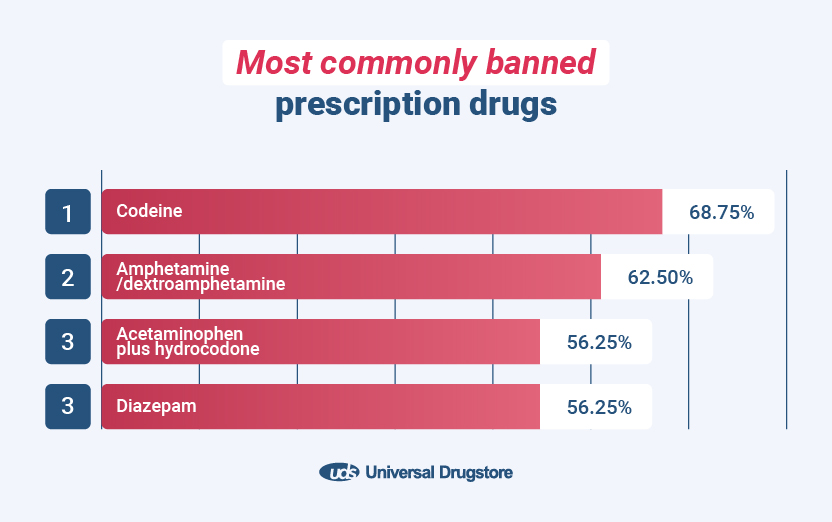

We’ve looked at the countries that are most known for having strict drug laws. These countries are China, Columbia, Egypt, Germany, India, Japan, Malaysia, the Philippines, Qatar, Saudi Arabia, Singapore, Thailand, Turkey, the United Arab Emirates, the United States, and Vietnam. Prescription drugs may be banned in countries other than the travel hotspots listed here, so ensure you research your next destination for its specific drug laws.
-
Codeine
Percentage of country bans: 68.75%
Though it is one of the most commonly taken opioid medications, codeine is at the center of the opioid addiction problem in several countries, including the United States. As a result, codeine is highly regulated and even prohibited in some countries. It is, therefore, no surprise that the drug is banned in almost 70% of the countries we looked at, which include top vacation destinations like Thailand and Japan.
-
Amphetamine/dextroamphetamine
Percentage of country bans: 62.50%
Amphetamines are primarily used to treat health problems such as obesity, narcolepsy, and ADHD. However, using amphetamines is illegal when they are used without a prescription. Hence, it is no wonder drugs containing amphetamine or dextroamphetamine are banned in over 60% of the countries on our list, including places such as Qatar, Singapore, and Saudi Arabia.
-
Acetaminophen plus hydrocodone
Percentage of country bans: 56.25%
Currently banned in almost 60% of countries on our list, drugs containing acetaminophen and hydrocodone are some of the most commonly prescribed for pain medication. However, they are also one of the most abused drugs by patients.
Taking large doses of hydrocodone in combination with acetaminophen puts you at risk of severe liver damage. This has resulted in several countries, including Germany, Malaysia, and Colombia, adding one or both of these drugs to their controlled substances list.
4. Diazepam
Percentage of country bans: 56.25%
Currently banned in almost 60% of countries on our list, drugs containing acetaminophen and hydrocodone are some of the most commonly prescribed for pain medication. However, they are also one of the most abused drugs by patients.
Taking large doses of hydrocodone in combination with acetaminophen puts you at risk of severe liver damage. This has resulted in several countries, including Germany, Malaysia, and Colombia, adding one or both of these drugs to their controlled substances list.
Diazepam also ranks third with 56.25% of country bans. In many countries, diazepam is only legal when prescribed by a doctor. It is often used to treat anxiety, muscle spasms, and seizures but can also be used to reduce alcohol withdrawal symptoms, such as sweating or difficulty sleeping. Although many countries do not allow diazepam, it is legal when only used as a prescribed drug.
It is important to note that if you are found in possession of any ‘prescription only’ drugs with no appropriate documentation, then your medication may be confiscated. In some cases, it may also lead to arrests, imprisonment, or hefty fines.
To summarise, ensure you remember to take all appropriate documentation with you, such as a doctor’s note that includes information about your medical condition, the prescribed medication, including details on dosage, and any other relevant details. There may also be specific medical forms to fill out before arriving in a different country, so do in-depth research.
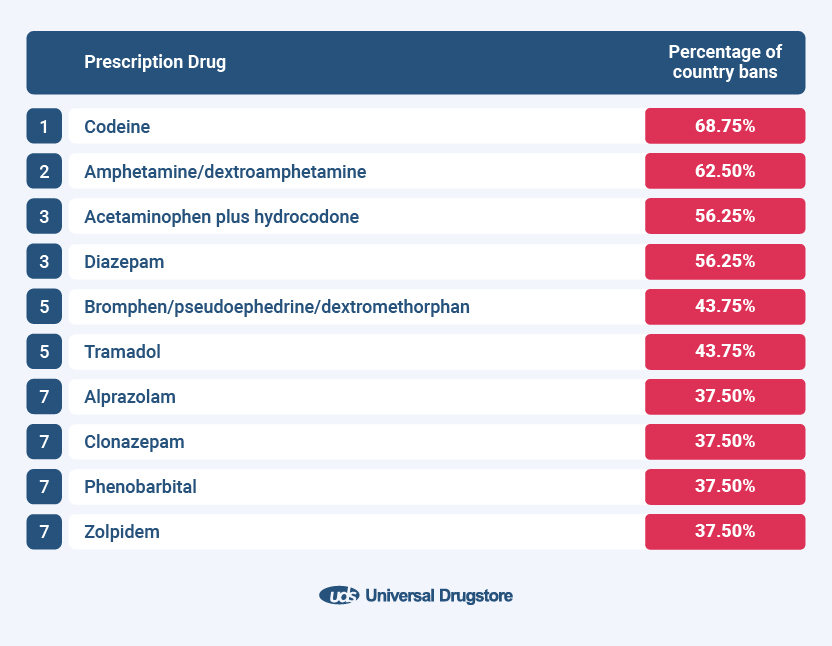

Countries with the most banned drugs
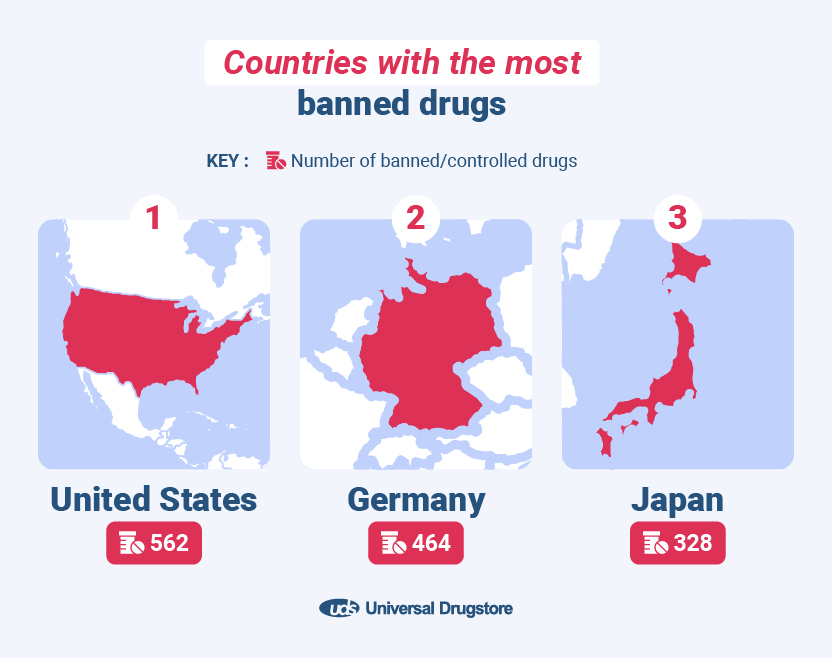

-
United States
No. of banned/controlled drugs: 562
Regarding countries with the most banned drugs, the United States takes first place, with 562 controlled substances on its ban list. Officially released by the US Department of Justice1, the list highlights single substances and drug combinations that are controlled and highly regulated. This includes common prescription drugs such as Codeine, Diazepam, and Tramadol.
-
Germany
No. of banned/controlled drugs: 464
Germany follows behind with 464 banned or controlled drugs, including commonly used prescriptions such as Amphetamines, Phenobarbital, and Zolpidem. However, travelers may take appropriate quantities of medications with them that have been prescribed by their doctor and for their personal use during their travel period in the country.
-
Japan
No. of banned/controlled drugs: 328
Japan completes the top three with over 300 banned or controlled drugs on its list. The popular tourist destination has listed commonly prescribed medications, including Pseudoephedrine, Clonazepam, and hydrocodone on its controlled substances list2.
Japanese law allows up to one month's supply of prescription medicine to be brought into the country. Travelers should obtain a copy of their doctor's prescription and a letter stating the purpose of the drug.
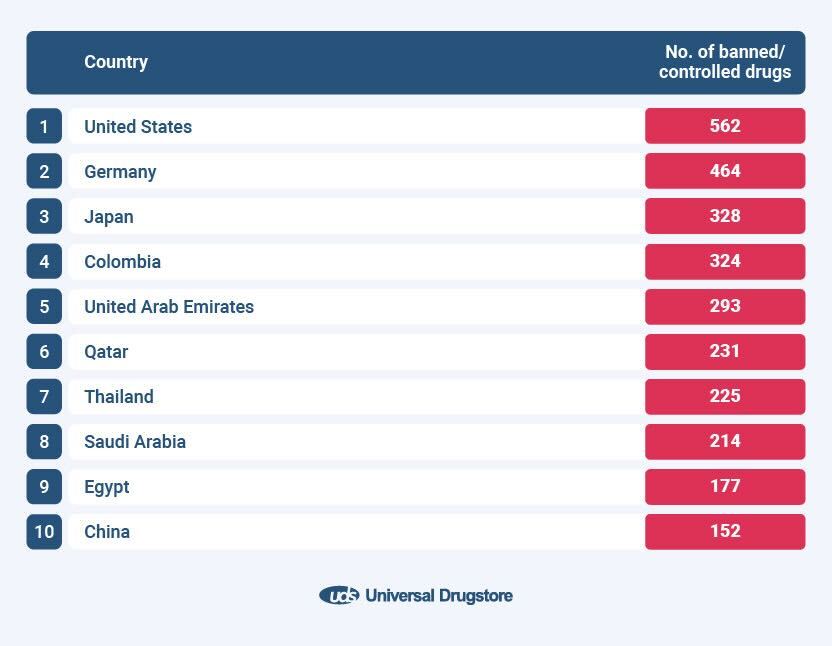

Countries with the harshest punishments for drug possession
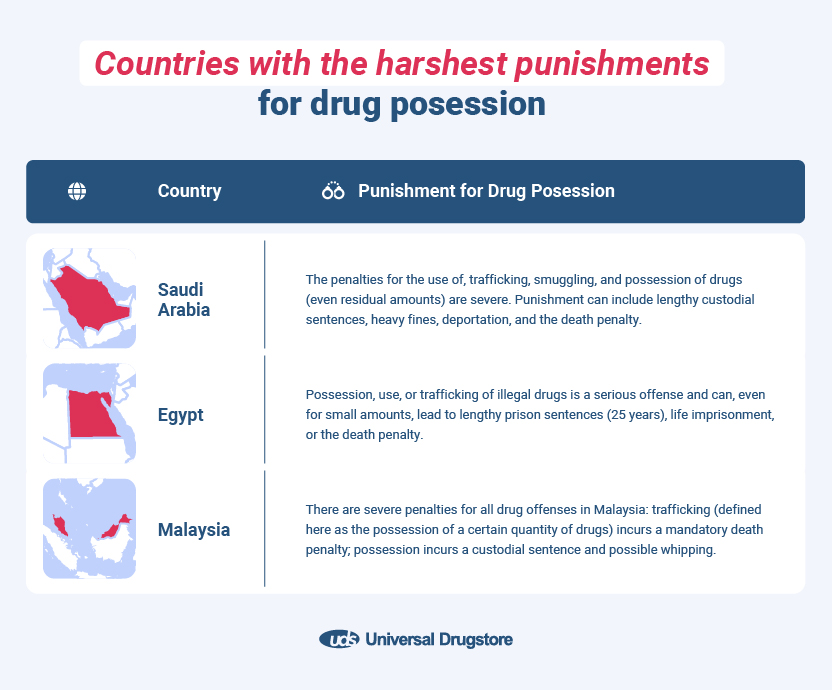

Several countries around the world have gained notoriety for implementing some of the harshest punishments for drug possession.
For example, nations such as Malaysia, Saudi Arabia, and Egypt have very strict laws where the possession of even small amounts of unauthorized drugs may result in lengthy prison sentences or, in extreme cases, the death penalty.
The possession of unauthorized drugs in countries such as Singapore, Japan, and the United Arab Emirates can lead to hefty fines.
Japanese law allows for a fine of up to 5,000,000 Yen ($33,578), while in the United Arab Emirates, offenders may face imprisonment of up to six months or a fine ranging from AED 20,000 to AED 100,000 ($5,446 - $27,229). In Singapore, the possession of controlled drugs can lead to 10 years imprisonment or S$20,000 ($14,948), in some cases both.
Countries with some of the longest prison sentences include Egypt, where even the possession of small amounts of unauthorized drugs can lead to prison sentences of up to 25 years. Similarly, in India, you could get up to 20 years in prison based on quantity and are liable to a fine of up to 200,000 rupees ($2,399).
It is important to note the severity of punishments in each country can vary based on the type and quantity of drugs as well as the specific circumstances of each case. Due to the strict measures imposed for drug possession, you must understand the drug regulations of the country you’ll be visiting.
|
Country |
Punishment for Drug Possession |
|
United States |
If an individual is caught in possession of illegal drugs or substances, they can face jail time for a year or less for a first offense. They could also face steep fines of at least $1,000. In some cases, the individual may also be required to commit to many hours of community service. |
|
Japan |
Use or possession of small amounts of drugs may result in a prison sentence of between one and ten years, and Japanese law allows for a fine of up to 5,000,000 Yen ($33,578). |
|
United Arab Emirates |
Offenders may face imprisonment of up to six months or a fine ranging from AED 20,000 to AED 100,000 ($5,446 - $27,229). |
|
Qatar |
Offenders can face long-term imprisonment and pay heavy fines, followed by deportation. Fines could range up to QR200,000 ($54,945) for the possession, use, and trafficking of illegal drugs. |
|
Thailand |
In Thailand, offenders may face a prison term of no longer than one year and/or a fine of no more than 20,000 Baht ($570,23) for unauthorized drug possession. |
|
Germany |
Individuals may receive up to five years of imprisonment for any drug-oriented behaviors, such as buying, possessing, and selling in Germany. |
|
Saudi Arabia |
The penalties for the use of, trafficking, smuggling, and possession of drugs (even residual amounts) are severe. Punishment can include lengthy custodial sentences, heavy fines, deportation, and the death penalty. |
|
Egypt |
Possession, use, or trafficking of illegal drugs is a serious offense and can, even for small amounts, lead to lengthy prison sentences (25 years), life imprisonment, or the death penalty. |
|
China |
Drug use is an administrative and not criminal offense. Individuals detained by public security authorities are subject to coercive or compulsory “treatment,” which can include community-based detoxification and rehabilitation and two years of compulsory isolation. |
|
Philippines |
Imprisonments ranging from six months and one day to four years and a fine ranging from 600 to 4,000 pesos ($10.80 - $72.05) shall be imposed upon any person possessing or using any regulated drug without the corresponding license or prescription. |
|
Malaysia |
There are severe penalties for all drug offenses in Malaysia: trafficking (defined here as the possession of a certain quantity of drugs) incurs a mandatory death penalty; possession incurs a custodial sentence and possible whipping. |
|
India |
Based on quantity, you could get anywhere from 6 months to 20 years in prison and are liable to a line or up to 200,000 rupees ($2,399). |
|
Vietnam |
Illegal possession of narcotic substances may carry a penalty of up to life imprisonment or a fine of up to VND 10 million ($411,60). |
|
Singapore |
Unauthorized possession of controlled drugs can be sentenced to a maximum of 10 years imprisonment or S$20,000 ($14,948) or both. |
|
Turkey |
Prison sentences of 1-2 years for those who buy, receive, cultivate, or possess drugs for personal use. There is also the option of treatment and/or probation of up to 3 years. |
|
Columbia |
Colombia’s current law should apply in all cases. The Colombian Constitutional Court has made it clear that possession of a personal dose of any drug is decriminalized. |
Celebrities caught traveling with drugs
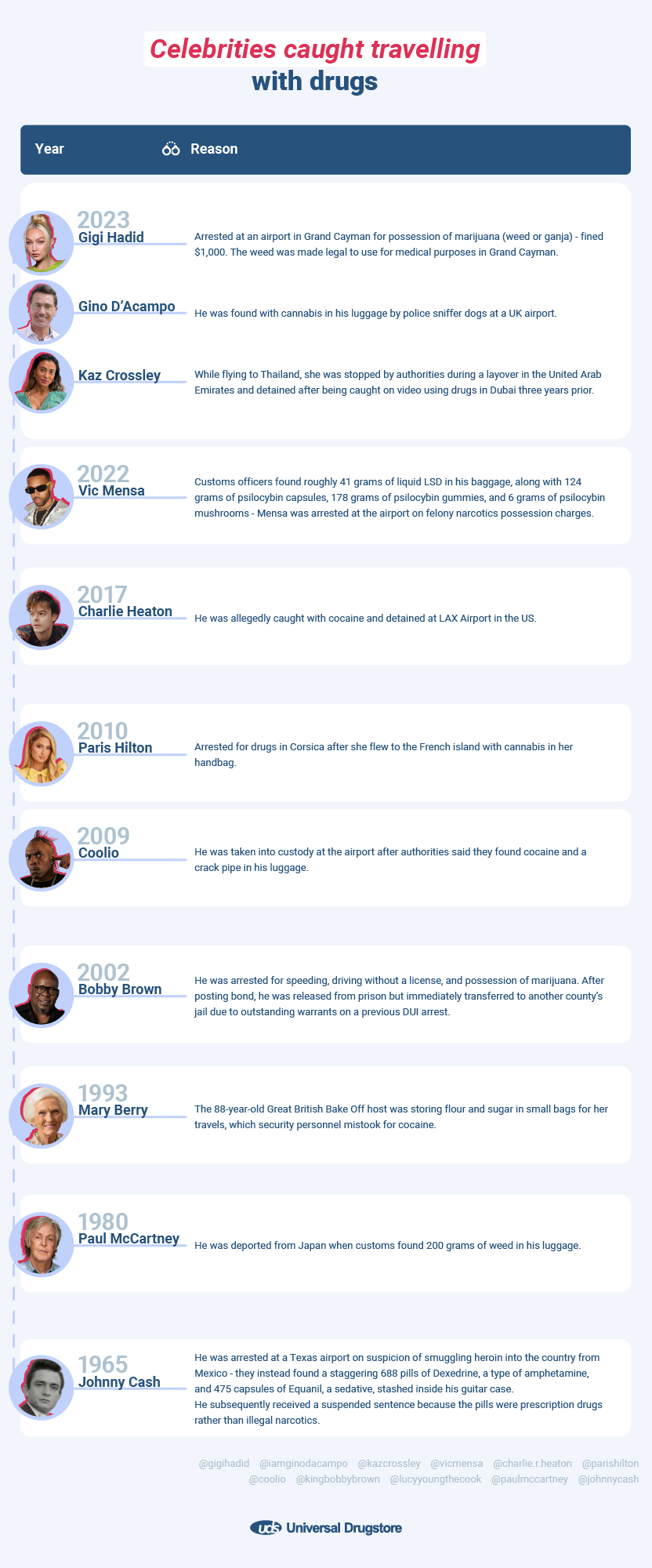

Earlier this year, American model Gigi Hadid was arrested for the importation of marijuana at an airport in Grand Cayman. Due to possession of the drug, the popular social media star was subject to paying a fine of 1,000 Cayman Islands dollars ($1,200) despite being legal to use for medical purposes.
Italian celebrity chef Gino D’Acampo was also detained in a UK airport this year after police sniffer dogs found cannabis in his luggage. Similarly, authorities stopped Love Island star Kaz Crossley at an airport in the United Arab Emirates after a video of her using drugs in Dubai resurfaced three years later.
Meanwhile, Great British Bake Off icon Mary Berry confessed that she was arrested by US customs officers on suspicion of drug smuggling while traveling. In a comical twist, she carried small bags of flour and sugar that were mistaken for cocaine.
Jamie Winn PharmD, Medical Director at Universal Drugstore shares valuable insight on how to navigate traveling with prescribed medications:
“Traveling with prescription drugs demands a good level of research on the legal drug laws in your host country, and you must understand the medication regulations of your destination. Though they may be legal in your country, some medications may have strict rules elsewhere.
If your prescription includes controlled substances, be extra cautious. Always carry a copy of your prescription, clearly stating your medical condition and the necessity of the prescription drugs. Familiarize yourself with the generic names of your medication too, as brand names can vary globally. Ensure that you stay informed as regulations change; therefore, you must check for updates on reliable government sources.
Prepare for the unexpected when traveling with prescriptions. Pack extra medication to account for any delays or unforeseen circumstances, but stay aware of the limits in each country. For example, some countries only allow a month's worth of medication. Consider carrying a basic first aid kit with essential over-the-counter medications that might be hard to find in your holiday destination.
Finally, you may want to consult your healthcare provider before going on your trip. If you are aware that you will need to carry a banned medication while traveling, they can guide you through the process and anticipate any adjustments, allowing for a much smoother, stress-free travel experience.”
Methodology
To determine which holiday destinations have the most prescription drug bans, we created a seed list of the most common prescription drugs using articles such as Singlecare and Medical News Today. This data was collected on 17/11/2023.
We analyzed the drug ban list of the countries most commonly known to have the strictest drug laws. Using each country’s drug list, such as the US banned drug list and UAE drug list, we uncovered the most prohibited medications across various countries by searching the most common prescription drugs against this list. A full list of all sources can be found here.
We calculated the percentage of countries that have banned each specific drug compared to a total of 16 countries. Data collection for this section was completed on 28/11/2023.
To reveal the holiday destinations with the harshest consequences for travelers, we looked through articles such as Fit For Travel, Edinburgh News, and Country Living to determine our list of countries. We then researched each country's drug laws and punishments for drug possession. Completion of data collection was on 27/112023 for this section. A full list of all sources can be found here.
To gain figures on the countries with the most banned drugs, we searched through each country’s banned drug list to find the estimated total number of medications prohibited. This also took into account single substances as well as drug combinations. Data collection for this section was completed on 27/112023.
We researched articles such as BBC News, The Sun, and The Independent to discover which celebrities have been caught smuggling drugs into other countries. This data was collected on 20/11/2023.
We converted each country's currency into USD using a currency converter to determine how much fines for drug possession could cost in US Dollars. This data was collected on 27/11/2023.
References:
1 https://www.deadiversion.usdoj.gov/schedules/orangebook/c_cs_alpha.pdf
About Universal Drugstore
Welcome to Universal Drugstore. Our licensed online pharmacy is one of Canada's oldest, largest, and most trusted online prescription referral services, with over 22 years of experience assisting individuals in accessing affordable prescription drugs, OTC drugs, and pet meds. Enjoy significant discounts and savings when you choose Universal Drugstore for all of your medications and pet meds needs. Our prices are up to 80% lower than your local or online pharmacy. We work hard to ensure that you will receive the best value for you or your pet’s health and well-being. Our Top 5 Medications









